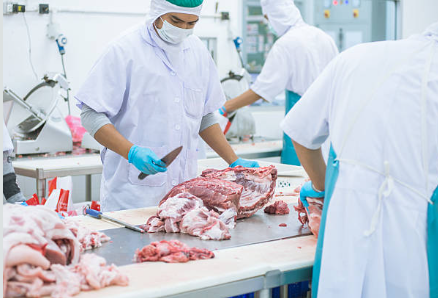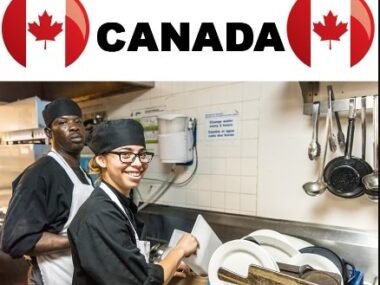Meat Processing Jobs in the USA is home to a booming food processing industry, being some of the most in-demand positions in the country.
For international workers seeking to start a career in the U.S., many meat processing companies offer job opportunities with visa sponsorship, making it possible for qualified workers to live and work in the United States while contributing to an essential industry.
Overview of the Meat Processing Industry in the USA
The meat processing industry in the United States plays a critical role in feeding the population and supporting the economy. The U.S. is one of the largest producers of meat in the world, including beef, poultry, pork, and lamb.
Meat processing plants are spread across the country, employing thousands of workers in a wide range of positions, from general laborers to highly skilled technicians and supervisors.
The meat industry is essential for producing the meat products that are consumed domestically and exported worldwide. Companies within the industry often face labor shortages, especially in rural areas, and rely on a mix of local and international workers to meet production demands.
Types of Meat Processing Jobs in the USA
Meat processing jobs in the USA encompass a variety of roles that cater to different skill levels. Some positions may require minimal experience, while others may demand specialized training. Here are some of the most common meat processing jobs available:
1. Meat Packers and Cutters
Job Description: Meat packers and cutters are responsible for cutting and preparing meat products for distribution. They work with knives, machines, and other tools to portion, package, and label meat. This position may require physical stamina and the ability to work in a fast-paced environment.
Skills Required: Basic knowledge of food safety and handling, physical strength, and manual dexterity.
2. Butchers
Job Description: Butchers are skilled workers who process and prepare meat, typically at slaughterhouses or meat markets. They cut whole animals into primal and sub-primal cuts of meat, including steaks, roasts, and sausages. Butchers often work with heavy machinery and knives.
Skills Required: Expertise in animal anatomy, advanced knife skills, and a deep understanding of meat cuts and food safety regulations.
3. Production Workers
Job Description: Production workers perform general tasks in meat processing plants, such as operating machinery, inspecting products, packaging, and handling raw materials. They help in the manufacturing process of different meat products like sausages, bacon, and frozen meat.
Skills Required: Ability to operate industrial machinery, attention to detail, and knowledge of workplace safety protocols.
4. Quality Control Inspectors
Job Description: Quality control inspectors are responsible for ensuring the safety and quality of meat products by monitoring production lines and inspecting finished goods for compliance with health regulations.
Skills Required: Knowledge of food safety regulations, attention to detail, and problem-solving skills.
5. Maintenance Technicians
Job Description: Maintenance technicians ensure that meat processing equipment and machinery are running smoothly. They perform regular maintenance, troubleshoot issues, and repair machinery when necessary.
Skills Required: Mechanical and electrical knowledge, problem-solving abilities, and attention to detail.
6. Slaughterhouse Workers
Job Description: Slaughterhouse workers are responsible for humanely slaughtering livestock, processing the carcasses, and preparing them for distribution to processing facilities. This is one of the most physically demanding roles in the meat processing industry.
Skills Required: Strong physical endurance, ability to handle machinery, and knowledge of slaughterhouse safety and sanitation protocols.
Visa Sponsorship
For international workers who wish to pursue a career in the U.S. meat processing industry, obtaining a job with visa sponsorship is a crucial step. Several types of visas may be available for meat processing jobs, depending on the position and the worker’s qualifications.
Below are the most common types of visa sponsorship options:
1. H-2B Temporary Non-Agricultural Worker Visa
The H-2B visa is for temporary workers in non-agricultural jobs, such as meat processing. It is typically used by companies facing labor shortages in industries like hospitality, construction, and food processing.
The H-2B visa is available for workers who are coming to the U.S. for seasonal or temporary employment, and it is renewable for up to three years.
Eligibility: To qualify for the H-2B visa, workers must have an offer of employment from a U.S. employer who has obtained labor certification from the Department of Labor. The employer must demonstrate that there are not enough U.S. workers available to fill the position.
2. H-1B Specialty Occupation Visa
The H-1B visa is for workers in specialty occupations that typically require a bachelor’s degree or equivalent. Although many meat processing jobs are entry-level, there may be specialized roles, such as engineers, managers, or supervisors, that qualify for the H-1B visa.
Eligibility: To qualify for the H-1B visa, workers must have a job offer from a U.S. employer, and the employer must demonstrate that the position requires a degree or specialized knowledge.
3. Permanent Residency (Green Card)
In some cases, international workers may be able to obtain permanent residency (a green card) through employment-based immigration.
Certain positions, such as management or supervisory roles, may offer the possibility of green card sponsorship if the employer is willing to sponsor the employee for permanent residency.
Eligibility: To apply for a green card through employment, workers must be sponsored by a U.S. employer, and the employer must demonstrate that there is no qualified U.S. worker available for the position.
How to Find Meat Processing Jobs with Visa Sponsorship
Finding meat processing jobs in the USA with visa sponsorship requires research, preparation, and careful planning. Here are some tips to help you secure a job in the U.S. meat processing industry:
1. Research U.S. Meat Processing Companies
Start by researching companies in the U.S. that are known for hiring international workers and offering visa sponsorship.
Some of the largest meat processing companies in the U.S. include Tyson Foods, JBS USA, Cargill, and Smithfield Foods. These companies frequently sponsor foreign workers for meat processing jobs.
2. Check Job Listings on Online Job Portals
Websites like Indeed, Monster, and Glassdoor often have listings for meat processing jobs that offer visa sponsorship. Look for positions labeled as “H-2B Visa Sponsorship Available” or “Visa Sponsorship Provided” in the job description.
3. Work with Recruitment Agencies
Some recruitment agencies specialize in helping international workers find jobs in the U.S., including in the meat processing sector. These agencies can help connect you with employers willing to sponsor your visa and assist you throughout the application process.
4. Contact U.S. Employers Directly
You can also reach out to U.S. meat processing companies directly to inquire about job opportunities and visa sponsorship. Be prepared to demonstrate your qualifications and explain why you are a good fit for the position.
Benefits of Working in Meat Processing Jobs in the USA
Working in the U.S. meat processing industry comes with several benefits:
1. Competitive Salary: Meat processing jobs often offer competitive wages, especially in rural areas where there may be a higher demand for labor. Workers in supervisory or specialized roles can earn even higher salaries.
2. Career Advancement: The meat processing industry offers plenty of opportunities for career growth. With experience and additional training, workers can move into higher-paying positions, such as managers, maintenance supervisors, and quality control experts.
3. Healthcare and Benefits: Many U.S. meat processing companies offer comprehensive health insurance, retirement plans, and other benefits to their employees.
4. Cultural Exchange: Working in the U.S. offers international workers the chance to experience American culture, learn new skills, and gain valuable work experience that can benefit them in future roles.
Conclusion
Meat processing jobs in the USA with visa sponsorship provide an excellent opportunity for international workers seeking to live and work in the United States. The U.S. meat processing industry is growing rapidly, and companies are always looking for skilled and motivated workers.
By understanding the different types of positions available, the visa sponsorship process, and the benefits of working in this sector, international workers can take the necessary steps to secure a rewarding job in the U.S. meat processing industry.
If you are interested in pursuing a career in meat processing, start researching job opportunities and consider reaching out to U.S. employers offering visa sponsorship. With the right qualifications and determination, you can build a successful career in one of the most vital industries in the United States.






